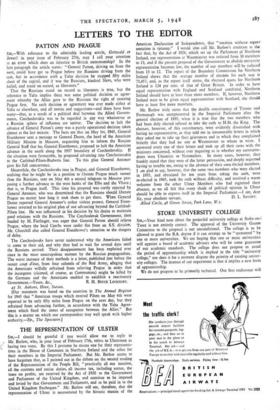THE REPRESENTATION OF ULSTER
SIR —I should be grateful if you would allow me to reply to Mr. Barlow, who, in your issue of February 27th, refers to Ulstermen as having two votes. By this I presume he means one for their representa- tives in the House of Commons in Northern Ireland and the other for their members in the Imperial Parliament. But Mr. Barlow seems to have forgotten that, as I pointed out in the debate on the second reading of the Representation of the People Bill, " practically all our taxation, all the customs and excise duties, all income tax, including surtax, the taxes on profits, are reserved by the Act of 1920 to the Government and Parliament of the United Kingdom, and continue to be imposed and levied by that Government and Parliament, and to be paid in to the United Kingdom Exchequer." Mr. Barlow will see, therefore, that the representation of Ulster is necessitated by the historic maxim of the American Declaration of Independence, that " taxation without- repro-' sentation is tyranny." I would also call Mr. Barlow's attention to the fact that, by the Act of 1920, which set up the Parliament of Northern' Ireland, our representation at Westminster was reduced from 30 members to 13, and if the present proposal of the Government to abolish university representation becomes law, the number of our members will be reduced from 13 to 12. The report of the Boundary Commission for Northern Ireland shows that the average number of electors for each seat is 71,457, and, as the report itself states, the electoral quota for Northern Ireland is 124 per cent. of that of Great Britain. In order to have equal representation with England and Scotland combined, Northern Ireland should have at least three more members. If, however, Northern Ireland were to be given equal representation with Scotland, she should have at least five more members.
Mr. Barlow truly states that the double constituency of Tyrone and Fermanagh was unrepresented in the Imperial Parliament after the general election of 1935, when it is true that the two members who had been duly elected refused to take the oath to H.M. the King. The electors, however, of this constituency, were evidently dissatisfied with having no representative, as they told me in innumerable letters in which they asked me to take up their grievances and in which they complained bitterly that they had no one at Westminster to whom to write. I answered every one of their letters and took up all their cases with the ministers concerned, without ever inquiring as to whether my correspon- dents were Unionists or Nationalists. In many cases, however, they frankly stated that they were of the latter persuasion, and deeply regretted having to trouble me, owing to the absence of their own elected members. I am glad to say, however, that the same two members who were elected in 1935, and abstained for ten years from taking -the oath, were re-elected in 1945, took the oath without difficulty, and received a warm welcome from the other Ulster Members who had regretted their absence, as we all felt that every shade of political opinion in Ulster should be able to express itself in the Imperial Parliament.—I am, dear
Sir, your obedient servant, D. L. SAVORY. Allied Circle, 46 Green Street, Park Lane, W.r.






























 Previous page
Previous page